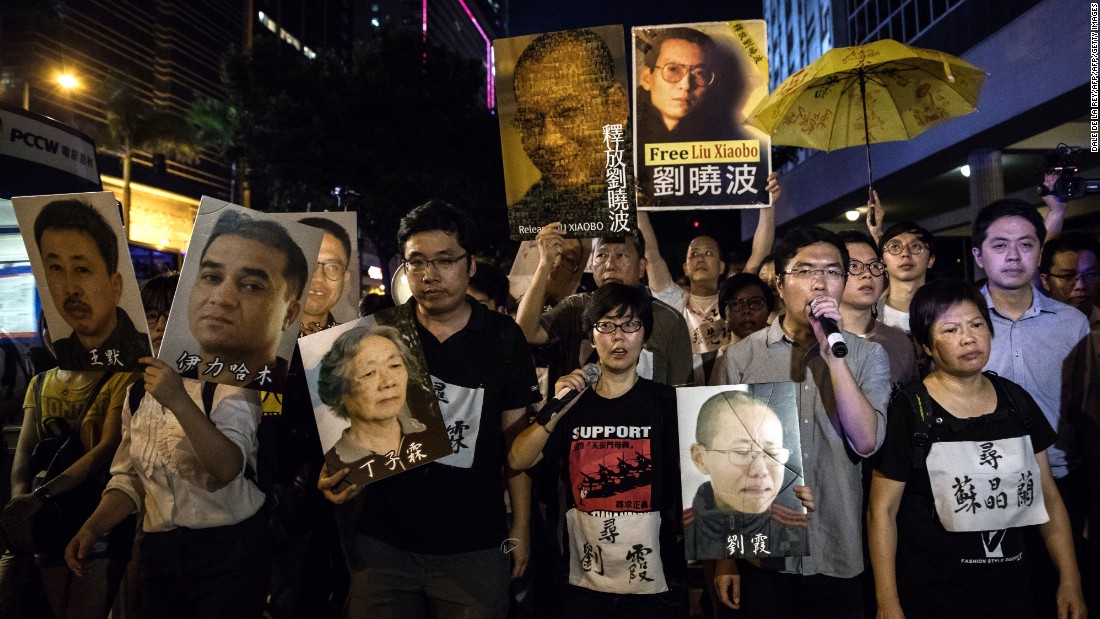
Residents of the semi-autonomous city only need to look across the border at mainland China to get a glimpse of how "national security" -- broadly and vaguely defined -- can be used as a convenient pretext for the political prosecution of dissidents, activists, human rights lawyers and journalists.
Nobel Peace Prize laureate Liu Xiaobo, for example, was sentenced to 11 years in prison for "inciting subversion of state power." Prior to his arrest, Liu helped draft a manifesto calling for democracy and political reform in China. Liu died of multiple organ failure in 2017 after being diagnosed with liver cancer, making him the first Nobel Peace Prize winner to die in state custody since Carl von Ossietzky, who was imprisoned by Nazi Germany.
China enacted its first National Security Law in 1993, which focused on issues relating to espionage activities. That law was replaced by the Counterespionage Law in 2014 with updated rules that more closely targeted foreign spies -- as well as Chinese individuals and organizations who collaborate with them.
In 2015, China passed a sweeping new National Security Law covering a much wider array of areas, including, but not limited to defense, politics, the economy, the environment, technology, cyberspace, outer space, culture, ideology and religion.
The new law is part of a broader push by Chinese President Xi Jinping to strengthen national security. A year after he came to office, Xi set up a powerful National Security Commission -- which he heads himself -- to lead the effort and increase coordination among the various wings of the country's security bureaucracy.
But long before the new National Security Law went into effect, the Chinese government had been throwing dissidents, activists, human rights lawyers and journalists in jail for national security crimes -- a trend that has only intensified under Xi's crushing crackdown on activism and dissent.
Jailed on national security grounds
In 2014, Uyghur economist Ilham Tohti was sentenced to life imprisonment for "separatism." Before he was imprisoned, Tohti was known for his research on Uyghur-Han relations and has been a vocal critic of the government's ethnic policies in Xinjiang, a resource-rich region long inhabited by the Uyghur minority.
In 2015, veteran journalist Gao Yu was handed a seven-year jail sentence for "illegally providing state secrets to foreign entities." She was accused of disclosing an internal party document in 2013 to an overseas Chinese-language news organization.
Known as "Document No.9," it revealed the Chinese Communist Party's ideological battle plan to counter advocates of constitutional democracy, banning public discussions on topics ranging from press freedom, civil rights to judicial independence.
In November 2015, Gao's term was reduced to five years, and was allowed to serve her sentence outside prison on medical grounds. She also served more than five years in jail in the 1990s on similar charges.
More recently, China sentenced Wang Yi, a prominent pastor of one of China's largest house churches, to nine years in jail at the end of December. He was convicted of "inciting subversion of state power."
National security crimes of subversion and inciting subversion were also used by the Chinese government to imprison human rights lawyers and activists detained in July 2015 -- a nationwide roundup later became known as the infamous "709 crackdown."
In the summer of 2016, Lawyer Zhou Shifeng was sentenced to seven years in prison for "subverting state power," and democracy advocate Hu Shigen was jailed for seven and a half years for the same crime.
In 2017, lawyer Jiang Tianyong was sentenced to two years in jail for "inciting subversion of state power," and human rights activist Wu Gan was handed a jail term of eight years for "subverting state power."
In 2019, prominent rights lawyer Wang Quanzhang was sentenced to four and a half years in jail for "subverting state power," after having languished in detention for more than three and half years.
Non-mainland Chinese citizens have also been imprisoned for national security crimes. Taiwanese pro-democracy activist Lee Ming-che, for example, was sentenced in 2017 to five years in prison for "subverting state power."
China has also arrested two Canadian citizens for what it says are suspected crimes relating to state secrets, shortly after Canada arrested an executive from Chinese tech giant Huawei on behalf of the US. Former diplomat Michael Kovrig was accused of "gathering state secrets and intelligence for foreign (forces)," and businessman Michael Spavor was accused of "stealing and illegally providing state secrets for foreign (forces)." Both have been in detention in China since December 2018.
World - Latest - Google News
May 23, 2020 at 08:13AM
https://ift.tt/2TMs2Sz
A national security law is coming to Hong Kong. Here's how it has been used to crush dissent in China - CNN
World - Latest - Google News
https://ift.tt/2SeTG7d
Bagikan Berita Ini














0 Response to "A national security law is coming to Hong Kong. Here's how it has been used to crush dissent in China - CNN"
Post a Comment